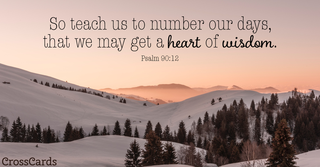- Recent Translations
- All Translations
Psalm 90
Share
Settings
Psalm 90 Commentary
Chapter 90
The eternity of God, the frailty of man. (1-6) Submission to Divine chastisements. (7-11) Prayer for mercy and grace. (12-17)
Verses 1-6 It is supposed that this psalm refers to the sentence passed on Israel in the wilderness, ( Numbers 14 ) . The favour and protection of God are the only sure rest and comfort of the soul in this evil world. Christ Jesus is the refuge and dwelling-place to which we may repair. We are dying creatures, all our comforts in the world are dying comforts, but God is an ever-living God, and believers find him so. When God, by sickness, or other afflictions, turns men to destruction, he thereby calls men to return unto him to repent of their sins, and live a new life. A thousand years are nothing to God's eternity: between a minute and a million of years there is some proportion; between time and eternity there is none. All the events of a thousand years, whether past or to come, are more present to the Eternal Mind, than what was done in the last hour is to us. And in the resurrection, the body and soul shall both return and be united again. Time passes unobserved by us, as with men asleep; and when it is past, it is as nothing. It is a short and quickly-passing life, as the waters of a flood. Man does but flourish as the grass, which, when the winter of old age comes, will wither; but he may be mown down by disease or disaster.
Verses 7-11 The afflictions of the saints often come from God's love; but the rebukes of sinners, and of believers for their sins, must be seen coming from the displeasure of God. Secret sins are known to God, and shall be reckoned for. See the folly of those who go about to cover their sins, for they cannot do so. Our years, when gone, can no more be recalled than the words that we have spoken. Our whole life is toilsome and troublesome; and perhaps, in the midst of the years we count upon, it is cut off. We are taught by all this to stand in awe. The angels that sinned know the power of God's anger; sinners in hell know it; but which of us can fully describe it? Few seriously consider it as they ought. Those who make a mock at sin, and make light of Christ, surely do not know the power of God's anger. Who among us can dwell with that devouring fire?
Verses 12-17 Those who would learn true wisdom, must pray for Divine instruction, must beg to be taught by the Holy Spirit; and for comfort and joy in the returns of God's favour. They pray for the mercy of God, for they pretend not to plead any merit of their own. His favour would be a full fountain of future joys. It would be a sufficient balance to former griefs. Let the grace of God in us produce the light of good works. And let Divine consolations put gladness into our hearts, and a lustre upon our countenances. The work of our hands, establish thou it; and, in order to that, establish us in it. Instead of wasting our precious, fleeting days in pursuing fancies, which leave the possessors for ever poor, let us seek the forgiveness of sins, and an inheritance in heaven. Let us pray that the work of the Holy Spirit may appear in converting our hearts, and that the beauty of holiness may be seen in our conduct.
Psalm 90 Commentaries
Chapter Summary
INTRODUCTION TO PSALM 90
\\<>\\. Here begins the fourth part of the book of Psalms, and with the most ancient psalm throughout the whole book, it being written by Moses; not by one of that name that lived in later times; nor by one of his posterity; nor by some one who composed it, agreeably to his words and doctrines, and called it by his name; but by that Moses by whom the Lord brought the children of Israel out of Egypt, led them through the wilderness to the borders of Canaan's land, and by whom he delivered to them the lively oracles; and who is described as the man of God, a title given to Moses, De 33:1, so called, not as a creature of his make, so all men are; nor as a man of grace, born of God, so is every saint; but a man of more than ordinary gifts received from the Lord, a prophet of the Lord, and the chief of the prophets, and a type of the great Prophet; so inspired men and prophets under the Old Testament bear this name, and ministers of the Gospel under the New, \1Ki 17:18,24 2Pe 1:21 2Ti 3:17\. It is a conceit of Bohlius, that this prayer of his (so it is called, as several other psalms are, see Ps 17:1,86:1,102:1,142:1) was made by him when he was about seventy years of age, ten years before he was sent to Pharaoh, while he was in Midian, which he gathers from Ps 90:10; others think it was written towards the end of his life, and when weary of it, and his travels in the wilderness; but it is more generally thought that it was penned about the time when the spies brought a bad report of the land, and the people fell a murmuring; which provoked the Lord, that he threatened them that they should spend their lives in misery in the wilderness, and their carcasses should fall there; and their lives were cut short, and reduced to threescore years and ten, or thereabout; only Moses, Joshua, and Caleb, lived to a greater age; and on occasion of this Moses wrote this psalm, setting forth the brevity and misery of human life; so the Targum, ``a prayer which Moses the prophet of the Lord prayed, when the people of the house of Israel sinned in the wilderness.'' Jarchi and some other Jewish writers {z} not only ascribe this psalm to Moses, but the ten following, being without a name; but it is certain that Psalm 95 was written by David, as appears from Heb 4:7 and Psalm 96 is his, compared with 1Ch 16:23 and in Psalm 99 mention is made of Samuel, who lived long after the times of Moses.

